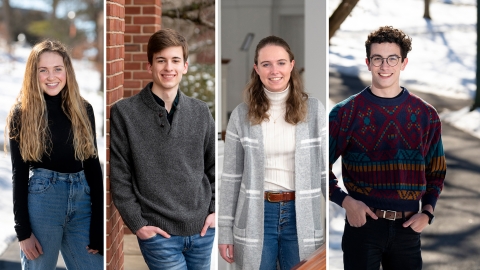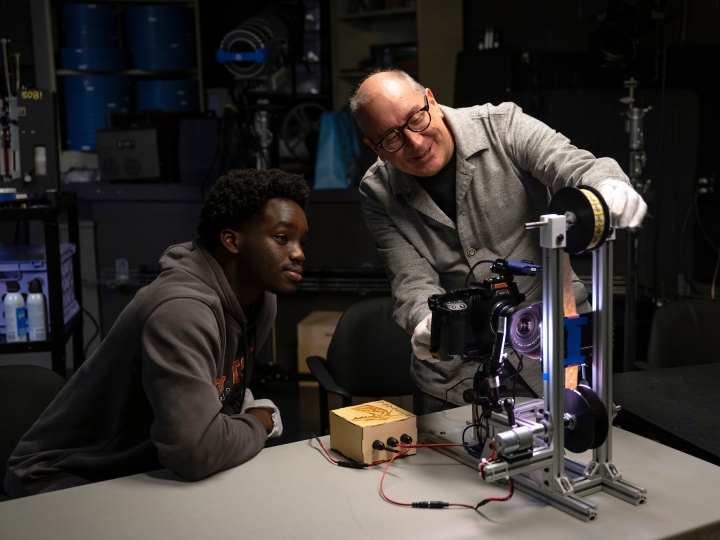
A Culture of Innovation: University Innovation Fellows Create New Experiences and Enhance Old Ones
March 2, 2021
Bucknell's newest class of University Innovation Fellows. From left: Colleen Hull '22, Taylor Graybill '22, Caitlyn Schuette '22, Nick DeMarchis '22. Photos by Emily Paine, Communications
From the day he arrived at Bucknell, Taylor Graybill '22 began thinking in ways he never had before — even before he set foot in a classroom.
Graybill, an accounting major from McAlisterville, Pa., signed up for the Design Thinking Leadership Pre-Orientation program, an immersive kick-off to college life where he'd spend five days helping local businesses develop out-of-the-box solutions to real problems and challenges, like helping a Thai restaurant launch new delivery options.
"It was such a unique experience unlike anything else that I had done in education before," Graybill says. "Being a participant really molded my first year here, and then I was lucky enough to be able to give back the next year as a program leader. It really felt like we were making a difference for the first-year experience."
For Graybill, it was just the start of a four-year journey of innovation and discovery. As he learned firsthand the change he could make by re-examining old practices and not standing on "the way things have always been done," he was inspired to look for other areas where he could make a difference in the Bucknell student experience.
Now, along with a few more like-minded peers, he's taking those efforts to the next level.
Last fall, Graybill and three of his classmates — Nick DeMarchis '22, Colleen Hull '22 and Caitlyn Schuette '22 — were selected to join the University Innovation Fellows, a global effort coordinated by Stanford University that trains college students to use design thinking to create student-centric learning experiences on their campuses.
A History of Innovation
The latest Innovation Fellows join more than 20 Bucknell students who have taken part in the program since 2012, including current students Mateo Conde '21, Kartikeya Sharma '21, Ryan Bailis '21, Julia Knox '21 and Emily Goldman '22. Each year, the fellows have worked to continue and expand projects launched by previous classes while simultaneously developing new projects of their own.
"When I think of innovation, I think not only about looking for additional perspectives when trying to solve problems, but also looking for new problems that might not be at the forefront of the attention of people in any given environment," explains DeMarchis, a computer engineering major from Enola, Pa.
In fact, the Pre-O program that opened Graybill's eyes to his power to innovate was conceived by an earlier class of fellows: Billy Wall '20, Caitlin Mahoney '19 and Jae Young Lee '19.
"Past fellows have worked really hard to give us that credibility and get stakeholders who are interested in working with our program," says Schuette, a chemical engineering major from Lothian, Md.
"They've really laid the foundation," adds Graybill. "Now we as new members have the opportunity to go before administration and say, 'Hey, I'd like to do X, Y or Z,' and we have an audience that will listen closely, because of the successful things that our previous members have accomplished."
In addition to the Pre-Orientation program, previous classes of Innovation Fellows created a peer mentorship program to extend and expand the Pre-O experience, molded a lounge in the South Campus Apartments into a creativity- and design-focused collaboration space, and launched a TedxBucknellUniversity speaker event.
Focus on Engagement
In the coming year, DeMarchis, Graybill, Hull and Schuette will take on a challenge confronting schools across the U.S. during the pandemic: keeping students who study remotely engaged and connected with their college experience.
"We really want to focus on the first-year experience specifically," says Schuette. "Students like us have already been here for a couple semesters, but for first-year students coming in who are remote, it's going to be harder to form that connection. So we've all been spending a lot of time thinking about what we can do for the first-year experience."
While Bucknell resumed in-person instruction last fall, students still have the option of studying remotely, and about 240 have taken that option this spring. Many schools across the country have much larger proportions of remote students, and some colleges remain entirely virtual.
While they're focusing on Bucknell, the fellows also have their eyes set on a broader impact, since they meet regularly with their counterparts at some of the 270 schools taking part in the program.
"I have a lot of friends at universities where their entire student population is online," Schuette says. "If we can find real, concrete ways to connect people in that virtual space, then we can leverage the organization to help students all around the world."
Together with Hull, a managing for sustainability and Spanish double major from Spring Lake, N.J., the fellows represent all three of Bucknell's colleges, proving that at Bucknell, innovation isn't confined to a particular field or major; it's everybody's business.
"I think Bucknell has a really strong foundation of entrepreneurship and innovation," Graybill says. "We're looking to build on that apparatus and see where existing programs may be less apparent to students. We're asking ourselves how we can increase that visibility as well as make programs or resources where they currently don't exist."

